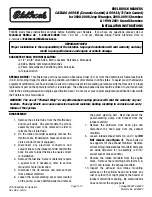
Catalog #70080, #70081, #70082, #70083
Brochure No. 63-0312
©2008 Edelbrock Corporation
Rev. 07/08
Page 7
1.3
Engine Operation Considerations
When used correctly, nitrous oxide safely elevates cylinder pressures and temperatures while increasing combustion rate.
These characteristics make the engine more sensitive to detonation. To ensure proper performance, engine and drive line
life, the following tips are suggested:
• Adequate Fuel Pressure and Delivery
When designing your fuel system, plan on your pumps and lines flowing at least 0.10 gallons per hour per horsepower.
The testing at Edelbrock was conducted with a fuel pressure of 6.5 psi.
Any variations from this fuel pressure
will cause your final air/fuel ratio to change. Consult our Technical Department for any questions on fuel pressure and its
effects on final air/fuel ratios when using nitrous oxide.
• Performer RPM II Fuel System Requirements
When using the Performer RPM II Series Kits, the potential horsepower gains are extremely high. The critical area for
continued success with your nitrous system lies in the fuel system. In the case of the Performer RPM II Series Nitrous
Systems, an auxiliary fuel supply system is a required addition to your nitrous system. A high flow electric fuel pump and
high capacity adjustable fuel pressure regulator are both recommended to ensure the fuel flow rate is enough to ensure
proper system operation. The minimum size we recommend for the fuel inlet feed line is a -6 (3/8” inch), with a size of
-8 (1/2” inch) recommended for the higher horsepower settings.
• Performer RPM II System Monitoring Requirements
Fuel pressure and nitrous pressure gauges are very important. Your fuel pressure must be set properly and a gauge is the
only sure way to monitor system performance. The same is true of the nitrous bottle pressure. A nitrous pressure gauge
is the only way to ensure that your system calibrations are within the parameters required of your horsepower settings.
• Fuel Quality
Because Nitrous oxide is an oxidizer, fuel selection is critical. Both octane and fuel consistency affect fuel burn rate. The
oxidizer quality of nitrous oxide will accelerate the burn rate, so we recommend a high quality of gasoline. We also
recommend you use the same grade of gasoline every time you use your nitrous oxide system. This will help maintain
the same fuel burn rate every time.
• Forged Pistons
With all nitrous oxide applications, forged pistons are highly recommended.
Because of heightened potential for
detonation, cast pistons are more prone to failure and cannot handle horsepower increases over 125hp.
Due to this fact,
the Performer RPM II Nitrous System requires that the engine has forged pistons.
Never initiate your nitrous
system before you are at full-load, wide open throttle conditions. Cast pistons will not be able to survive this kind of stress.
• Engine System Upgrades
With all performance modifications, complementary system upgrades will always serve to elevate the consistency and
longevity of an engine, especially when using nitrous oxide as a power adder. Modifications such as ignition upgrades,
free-flowing exhaust, camshafts, cylinder heads, and manifolds can all add to the performance of a nitrous oxide-injected
engine.
Anytime you have questions or concerns with your Edelbrock Nitrous System,
please call our technical support hotline at
1-800-416-8628
before you start your engine.
℡
℡








































